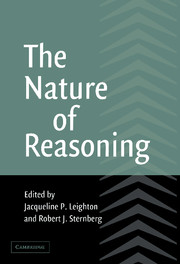Book contents
- Frontmatter
- Contents
- List of Contributors
- PART ONE THE BASICS OF REASONING
- PART TWO THE WORKINGS OF REASONING
- PART THREE THE BASES OF REASONING
- 11 The Assessment of Logical Reasoning
- 12 The Development of Deductive Reasoning
- 13 The Evolution of Reasoning
- 14 Individual Differences in Thinking, Reasoning, and Decision Making
- 15 Teaching Reasoning
- 16 What do We Know about the Nature of Reasoning?
- Index
12 - The Development of Deductive Reasoning
Published online by Cambridge University Press: 05 July 2011
- Frontmatter
- Contents
- List of Contributors
- PART ONE THE BASICS OF REASONING
- PART TWO THE WORKINGS OF REASONING
- PART THREE THE BASES OF REASONING
- 11 The Assessment of Logical Reasoning
- 12 The Development of Deductive Reasoning
- 13 The Evolution of Reasoning
- 14 Individual Differences in Thinking, Reasoning, and Decision Making
- 15 Teaching Reasoning
- 16 What do We Know about the Nature of Reasoning?
- Index
Summary
The ability to make deductive inferences is one of the defining characteristics of advanced human thinking. Being able to take some given premises as a base and then to explore the kinds of necessary deductions that can be made from them is a critical component of mathematics and science. More broadly, making inferences underlies much of our day-to-day thinking in varied contexts (e.g., Lea, O'Brien, Fisch, Noveck, & Braine, 1990). Understanding how this ability develops is a correspondingly important question, both for theoretical and practical reasons. However, the study of the development of deductive reasoning presents some major problems. As we shall see, there is not much consensus about just what children and adults can actually do, or about what, if anything, develops in deductive reasoning.
Underlying at least some of the problems that are present in this domain is an important question concerning the status of logic in the study of reasoning. There is a clear distinction to be made between deductive reasoning and logical reasoning (Overton, 1990). Deduction refers to the process of reaching a conclusion on the basis of some given premises. Logic is a formal domain that attempts to characterize specific forms of argument as being valid or invalid. In other words, logic provides textbook norms for correct deductions, norms that are often explicitly used in academic contexts to evaluate the adequacy of deductive reasoning.
- Type
- Chapter
- Information
- The Nature of Reasoning , pp. 313 - 338Publisher: Cambridge University PressPrint publication year: 2003



